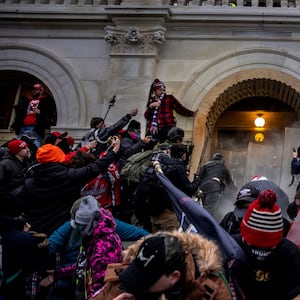Donald Trump is finally out of office and already threatening to run again in 2024 to reclaim his supposedly “stolen” presidency. Polls show a clear majority of Americans want the former president convicted and banned from running again, yet the U.S. Senate acquitted him again in his second impeachment trial, failing to achieve the two-thirds majority needed for conviction. With new evidence of Trump’s callous disregard of House Minority Leader Kevin McCarthy’s desperate pleas for help as the mob laid siege to the Capitol, can something more be done to hold Trump accountable?
The answer is yes—if there is the political will. There is the option to censure Trump with a majority vote in the Senate and the House that would include the proviso based on the 14th Amendment that he never be allowed to hold federal office again. Asked about censure at a post-acquittal press conference, Speaker Pelosi waved it away as ridiculously insufficient. “We censure people for using stationery for the wrong purpose. We don’t censure people for inciting insurrection.”
But what’s under consideration has a lot more heft constitutionally and morally. Virginia Senator Tim Kaine floated the idea last month along with Republican Susan Collins, who saw it as an alternative to a trial, and the blowback from Democrats was negative. Kaine was accused on social media of undercutting the Senate trial and the possibility of conviction. That wasn’t his intention. He thought he was being practical and making a good-faith effort to find a way out of the looming trap where Trump gets to proclaim his innocence after a second impeachment.
Allowing Trump to get away with impeachable behavior for a second time for even more egregious crimes against the Constitution is a terrible outcome, which is why the censure option is still alive. Former Democratic congressman David Skaggs from Colorado has been relentless in pushing the idea, which he described earlier this week in cinematic fashion to the Daily Beast:
“As soon as the gavel falls with less than two-thirds to convict, the majority leader calls up this resolution for which he may even have 60 votes in the Senate. It would be seizing the moment,” says Skaggs. “After non-conviction, Chuck could pull out the resolution which he would have in his hip pocket and go from there.” That didn’t happen, though Schumer did call the 43 votes to acquit Trump “a vote that will live in infamy.”
Skaggs left Congress in 1999 after serving 12 years but remains in close touch with his colleagues as chair of the Office of Congressional Ethics, established in 2008, and as vice chair of the National Endowment for Democracy. In an article for the conservative journal The National Interest, he quotes the pertinent language from Section 3 of the 14th Amendment, which was ratified in 1868 after the Civil War and includes the following language to disqualify confederates from holding government office.
“No person shall… hold any office… under the United States… who, having previously taken an oath… to support the Constitution of the United States, shall have engaged in insurrection or rebellion against the same, or given aid or comfort to the enemies thereof.”
Skaggs says any attempt to disqualify Trump will be tested in court, so It will take a law passed by both chambers of Congress and signed by the president, “that recites and makes findings that Trump’s crimes meet the requirement of conduct that aided or abetted insurrection. It must explicitly call on the authority given to Congress in Section 3 to disqualify the culprit,” he writes.
Majority Leader Chuck Schumer could have moved to censure as an alternative and the way that would have unfolded, according to a longtime Senate aide on the Democratic side, is with Schumer calling for a closed session of the entire Senate either before the final trial vote, or immediately after. In the pre-COVID days, the senators would retreat to the old Senate chamber for discussion and deliberation. “It can be done, the majority leader can do it,” says this aide. “But the idea that we could have any room to do something in a bipartisan way after what’s been shown to these senators, and they haven’t moved—reading the room, there’s not a lot of appetite to do censure after a vote to acquit.”
Moving ahead on censure will only happen if lawmakers feel the heat from voters to do something to hold Trump accountable after the exhaustive presentation by the impeachment managers, and the new information about Trump’s dereliction of duty once the riot was underway. The timeline probed in the question-and-answer session on Friday by Mitt Romney focused on Trump’s knowledge that Vice President Pence was in danger and yet did nothing to call off the mob.
The impeachment managers sought to rekindle the outrage Americans felt immediately after Jan. 6 through presentation of graphic surveillance video from inside the Capitol and never-before-heard cellphone calls from law enforcement pleading for backup. A renewed push for censure is possible if voters demand it and a collective will emerges to disqualify Trump from turning the insurrection into his reelection campaign.
Otherwise, even progressive activists on the Democratic side would rather move on than slog through another partisan vote. Republicans will only shift if forced by pressure from a public newly engaged and angered by what they saw in the trial presented by the Democrats that convincingly ties Trump directly to the insurrection.
We’ll know in a few days what the polls can tell us. Even so, Republican senators are not responsive to national polls. They are looking at primary voters in their state, and upwards of 80 percent of Republican primary voters wanted to see Trump acquitted. GOP leader McCarthy may have exchanged epithets with Trump on Jan. 6, but he has since visited the former president in Florida to talk about his helping win back the House and Senate in 2022.
Schumer may eventually move to censure, but only if more Republicans are willing to join the Democrats. “Nobody likes the outcome we’ve got here,” says the Democratic aide. “We’re going through this process for history. This is certainly not healing the country, though maybe over time it will. The goal is to keep this guy from running again. Watching people storm the Capitol on his behalf and watching people stick with him, I think he’ll be around for a while. He’s still clinging pretty well to this thing”—which is the big lie that he won.
A near party-line vote to bar Trump from running again sends a pretty bad signal, says a Democratic strategist who fears that makes it “feel like we’re afraid of him as a threat to our politics, when in fact we’re afraid of him as a threat to our democracy.”
That said, the last word here goes to Skaggs, who wonders if the energy and staying power of both House and Senate on this topic has been exhausted, at least for the time being. “Both bodies have other business that is pressing. But any current reluctance might be pushed aside if Trump himself says or does something to trigger the outrage all over again. That possibility is, I think, more than a theoretical one.”



